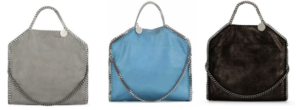Share This Article
The fashion industry welcomed the victory of company Stella McCartney Ltd. in the fight for the protection of the “Falabella” bag.
This is an interesting blog post initially published on IPTItaly blog by my colleagues Elena Varese and Leda Barkai, I hope you will enjoy it.
* * *
Plaintiff filed a lawsuit before the Court of Milan against Imax S.r.l., an Italian company in liquidation, based on design and trademark infringement, as well as on unfair competition.

Plaintiff launched the “Falabella” bag in 2009 and registered it with Community designs Nos. 001628157-0001, 001628199-0001 and 001628199-0002. Imax sold in Milan certain bags under the trademark “Massimiliano Incas”, which presented similar features with the “Falabella” bag and were advertised in the catalogues as “Mod. Stella McCartney”.
Defendant alleged that the disputed bags were different from the registered designs of Stella McCartney, as they presented a dissimilar shape, were made of real leather instead of eco-leather and included a shoulder belt. Furthermore, Imax claimed that the plaintiff’s designs were invalid, as their main features were already present in the market (namely, the chain belt was used in several models of Chanel and the trapezoidal shape was included in earlier registered designs).
Plaintiff argued that its designs were provided with individual character thanks to the “trapezoidal shape, the odd chain strap following the exterior flap of the bag and the eye-catching stitching”. On the contrary, Stella McCartney stated that the Chanel bags quoted by the defendant have a rectangular shape and their chain straps were fixed either to the body of the bag or to the external closures.
The Court of Milan held that the plaintiff’s designs are valid. In particular, the “Falabella” bag is new with respect to Chanel’s models, taking into account its different shape, size and ornament. As to the earlier designs referred by Imax, albeit including a trapezoidal shape, they also presented significant differences (i.e. there was no chain handle running through the profile of the bag).
Consequently, the defendant has reproduced all the main individual features of the Falabella designs, namely, the chain handles, the trapezoidal shape and the stitching.
Furthermore, the defendant was found to dilute the world-famous trademark “Stella McCartney”, as it presented its products as “Mod. Stella McCartney”.
In addition, the Court of Milan ruled in favour of plaintiff also on unfair competition, stating that a significantly lower price of the bags at issue caused a serious harm to the reputation of Stella McCartney. Moreover, the fact that Imax was selling bags in real leather conveyed a false and anti-environmental message towards consumers, as Stella McCartney had never used for its products materials of animal origin and made high investments to devise sustainable goods. This last conduct was considered to amount to a separate act of unfair competition for denigration.
Finally, the Court of Milan awarded damages in the measure of € 110,000, also taking into account the unfair conduct of the defendant, who modified certain invoice data and the name of the products, in the attempt to lower the sale figures, as well as the non-patrimonial damages suffered by Stella McCartney, as the infringing products were made of non-environmentally friendly materials.
The decision is interesting as it is one of the first times that an Italian Court considered the manufacturing of non-sustainable products as an independent act of unfair competition, entitling the plaintiff to recover separate damages. Further, the overall damages awarded are not negligible for a design infringement proceedings and could be encouraging for other right holders.


